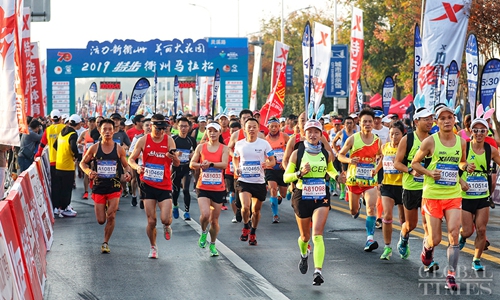HOME >> ARTS
China’s marathon organizers and runners prepare for tough competition after end of COVID-19 epidemic
By Bi Mengying Source:Global Times Published: 2020/2/26 18:41:49

Runners take part in the Quzhou Marathon in East China's Zhejiang Province on November 25, 2019. Photo: Cui Meng/GT
When asked what they want to do the most after the current COVID-19 epidemic ends, working at the office with colleagues, going shopping, enjoying barbeque outside were some of the most common answers from interviewees in a video that has been making the rounds on China's Twitter-like Sina Weibo lately. Among them, many running enthusiasts have also expressed their wishes to sign up for the marathon in Wuhan, the epicenter of the outbreak, so they could appreciate its beautiful scenery while running across the city.
Posing challenges
Originally scheduled for April 12, the Wuhan Marathon had enticed more than 197,000 people from 38 countries and regions to register for the race. More than 83 percent of these registrees, aged 16 to 81, are from outside Wuhan. However, in early February the event was postponed due to the COVID-19 outbreak.
The Wuhan Marathon is not the only such event to be hit hard by the outbreak. As of Monday, about 20 other marathons in China have been canceled and more than 100 have been delayed, according to a report from the Xinhua News Agency.
"Organizing large-scale competitions requires a lot of investment in time and money... With the cancelations and delays, many companies are looking at an almost zero return on investment and zero business for the first half of the year," Wu Wenlong, founder of Ningbo CityPace, a professional operating company in East China's Zhejiang Province, told the Global Times.
With the massive cancelations and delays in the first half of this year, it is estimated that many marathons will cram together during the second half of the year, leading organizers being thrust into fierce competition for venues, sponsors and runners, which is sure to pose difficult challenges for everyone involved.
New opportunities
Data from the Chinese Athletics Association shows that marathons have been rapidly developing and increasing in popularity in China in recent years. Back in 2010, there were merely 13 marathon events throughout the year across the country. By 2018 that number had jumped to 1,581.
With the COVID-19 outbreak, more and more people are paying more attention to exercise to strengthen their immune systems. As the vast majority of Chinese have been shunning outdoor activities, they have been turning to online exercise courses and exercising indoors.
Many sports companies are pointing out that the epidemic has brought the importance of exercise to the attention of the public. As such, many are predicting that there will be larger participation from the public and more government support for sports, including marathons, in the future.
Some companies have been treating the outbreak as an opportunity to reflect and adjust, with some business insiders saying that companies will force themselves to improve in order to prepare for the fierce competition that is likely to come during the remaining half of the year.
"We have hosted several meetings to discuss about expanding our business [online]," said Wu. In addition to conventional large-scaled competitions, the company plans to explore how to expand online and incorporate social media features among runners.
Ready to run
To stay in shape, some runners cooped up at home have been running their own marathons indoors. Pan Shancu from Hangzhou in East China's Zhejiang Province, for instance, once ran back and forth across his bedroom for five hours straight, which drew a lot of attention after he posted a video of his feat to social media.
"I strongly advise against such exercise. Most injuries from running are related to sudden acceleration, deceleration and changing of direction, and running circles at home is a combination of these movements," orthopedist Zhao Hui, chief medical officer of the AllinMD Orthopedics Hospital, an online medical platform told the Global Times.
As for running outdoors, Beijing authorities have advised the public to avoid crowds in the city's parks as the fight against the coronavirus continues. At a press conference held on Monday, Zhang Yahong, a spokesperson for the Beijing Municipal Administration Center of Parks, said that if the public wants to go to a park, they must first have their temperature taken. Once inside, they must wear masks at all time and keep a safe distance from one another.
Zhao suggested that runners who cannot run outdoors try jumping rope or HIIT (high-intensity interval training) such as Tabata at home to improve their circulatory and respiratory systems, and focus on training their core muscles and other important muscle groups used when running.
"These will help us better prepare for running outdoors after the epidemic ends," he concluded.
Posted in: CULTURE & LEISURE